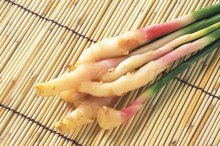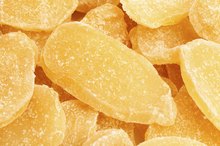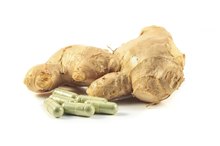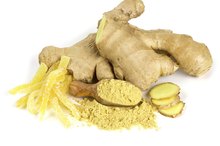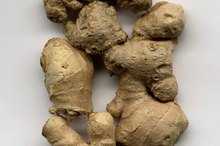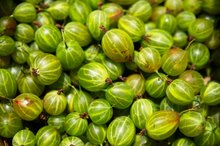Ginger as an Appetite Suppressant
Ginger has a history as a digestive aid. Chemicals in the ginger can impact your appetite and the way you feel, but not in terms of suppressing appetite. Instead, ginger can actually make you feel more hungry if you've lost your appetite due to nausea. Ask your doctor before using ginger or any alternative remedy for appetite.
Ginger
Ginger -- either raw or candied, alone or added to foods -- is part of the traditional herbal armamentarium. Its medicinal properties come largely from the molecule zingerone, which has a spicy-hot flavor. According to Drs. Penny Le Courteur and Jay Bureson in their book "Napoleon's Buttons," the zingerone molecule is chemically related to capsaicin from spicy peppers, and piperine from black pepper 1. It has a similar shape, and so acts similarly in the body.
- Ginger -- either raw or candied, alone or added to foods -- is part of the traditional herbal armamentarium.
Ginger and Your Digestive Tract
Crystallized Ginger Nutrition
Learn More
The University of Maryland Medical Center explains that ginger is a traditional remedy for nausea and vomiting 2. There's also scientific research to support its use as an anti-nauseant if you're pregnant and are experiencing morning sickness; an added benefit of ginger in this case is that it's safe for use in pregnancy. Chemotherapy patients also benefit from ginger for relief of nausea. Some individuals may find that ginger helps relieve inflammation and swelling in addition to its anti-nauseant properties.
- The University of Maryland Medical Center explains that ginger is a traditional remedy for nausea and vomiting 2.
- Some individuals may find that ginger helps relieve inflammation and swelling in addition to its anti-nauseant properties.
Ginger and Appetite
While ginger can certainly have an effect on your appetite, it's not likely to be one of suppressing it. Instead, ginger can make those suffering from nausea feel well enough to eat. There is no scientific research to suggest that ginger has appetite-suppressant properties. However, many people feel full after consuming flavored beverages. As such, drinking ginger tea might suppress your appetite temporarily simply because the tea fills your belly.
- While ginger can certainly have an effect on your appetite, it's not likely to be one of suppressing it.
- As such, drinking ginger tea might suppress your appetite temporarily simply because the tea fills your belly.
General Guidelines
Ginger & Heart Rate
Learn More
If you're interested in trying to use ginger as an appetite suppressant or for any other purpose, you should first consult with your doctor. Increased appetite can be a symptom of a digestive ailment -- a parasite, for instance -- and it's best to get a medical opinion before you try to treat it yourself. Options for suppressing appetite that are more effective than ginger include eating meals that contain combinations of protein and carbohydrates, as well as increasing your fiber and water intake.
Related Articles
References
- “Napoleon’s Buttons”; Penny Le Couteur and Jay Bureson; 2004
- University of Maryland Medical Center: Ginger
- Ryan JL. Treatment of chemotherapy-induced nausea in cancer patients. Eur Oncol. 2010;6(2):14-16.
- Marx W, Ried K, McCarthy AL, et al. Ginger-mechanism of action in chemotherapy-induced nausea and vomiting: A review. Crit Rev Food Sci Nutr. 2017;57(1):141–146. doi:10.1080/10408398.2013.865590
- Panahi Y, Saadat A, Sahebkar A, Hashemian F, Taghikhani M, Abolhasani E. Effect of ginger on acute and delayed chemotherapy-induced nausea and vomiting: a pilot, randomized, open-label clinical trial. Integr Cancer Ther. 2012;11(3):204–211. doi:10.1177/1534735411433201
- Haniadka R, Rajeev AG, Palatty PL, Arora R, Baliga MS. Zingiber officinale (ginger) as an anti-emetic in cancer chemotherapy: a review. J Altern Complement Med. 2012;18(5):440–444. doi:10.1089/acm.2010.0737
- Arslan M, Ozdemir L. Oral intake of ginger for chemotherapy-induced nausea and vomiting among women with breast cancer. Clin J Oncol Nurs. 2015;19(5):E92–E97. doi:10.1188/15.CJON.E92-E97
- Bossi P, Cortinovis D, Fatigoni S, et al. A randomized, double-blind, placebo-controlled, multicenter study of a ginger extract in the management of chemotherapy-induced nausea and vomiting (CINV) in patients receiving high-dose cisplatin. Ann Oncol. 2017;28(10):2547–2551. doi:10.1093/annonc/mdx315
- Palatty PL, Haniadka R, Valder B, Arora R, Baliga MS. Ginger in the prevention of nausea and vomiting: a review. Crit Rev Food Sci Nutr. 2013;53(7):659-69. doi:10.1080/10408398.2011.553751
- WholeHealth Chicago. Ginger. Updated May 12, 2009.
- Oncology Nutrition: a Dietetic Practice Group of the Academy of Nutrition and Dietetics. Dietary supplements.
- Marx W, Mckavanagh D, Mccarthy AL, et al. The effect of ginger (Zingiber officinale) on platelet aggregation: a systematic literature review. PLoS ONE. 2015;10(11):e0143675. doi:10.1371/journal.pone.0141119
- Chuah SK, Wu KL, Tai WC, Changchien CS. The effects of ginger on gallbladder motility in healthy male humans. J Neurogastroenterol Motil. 2011;17(4):411-5. doi:10.5056/jnm.2011.17.4.411
- National Center for Complementary and integrative Health. Ginger. Updated November 30, 2016.
- Bossi, P., Cortinovis, D., Fatigoni, et al. A Randomized, Double Blind, Placebo-Controlled, Multicenter Study of a Ginger Extract in the Management of Chemotherapy Induced Nausea and Vomiting (CINV) in Patients Receiving High Dose Cisplatin. Annals of Oncology. 2017. 28(10):2547-2551.
- Haniadka, R. et al. Zingiber officinale (Ginger) as an Anti-Emetic in Cancer Chemotherapy: A Review. Journal of Complementary and Alternative Medicine. 2012.18(5):440-4.
- Jordan, K., Jahn, F., and M. Aapro. Recent developments in the prevention of chemotherapy-induced nausea and vomiting (CINV): a comprehensive review. Annals of Oncology. 2015.26(6):1081-90.
- Pillai, A. et al. Anti-emetic effect of ginger powder versus placebo as an add-on therapy in children and young adults receiving high emetogenic chemotherapy. Pediatric Blood and Cancer.2011.56(2):234-8.
Writer Bio
Kirstin Hendrickson is a writer, teacher, coach, athlete and author of the textbook "Chemistry In The World." She's been teaching and writing about health, wellness and nutrition for more than 10 years. She has a Bachelor of Science in zoology, a Bachelor of Science in psychology, a Master of Science in chemistry and a doctoral degree in bioorganic chemistry.

